#credit goes to twitter user decoratedboar for the iceberg picture help
Text
The Subtle Horror of Evangelion
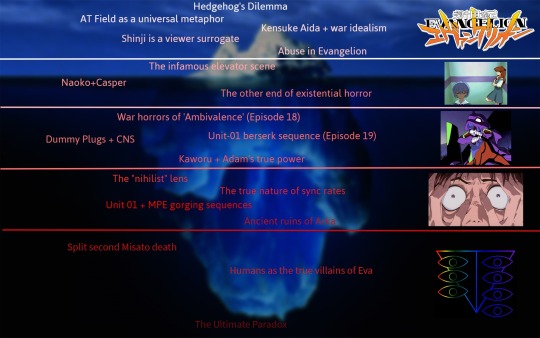
What keeps us all hooked to Eva time and time again? You get through your initial, confused watch of either Evangelion endgame, probably sometime in your adolescence wondering what the hell it is you just watched. The original source material is suffused with unsettling imagery, and sometimes too-close-for-comfort shorts. It’s so much to process that one watch is never enough. The imagery isn’t enough, however, because the mid-to-late-90s series comes with things you’ll pick up the more you focus on certain characters’ struggles or the interesting world-building. They arise little by little with every re-watch, adding onto what interested you in Eva to begin with.
There’s always that little voice asking you “What it is that really draws me here?”
Oh. The horrors.
The tragedy of it all.
These things never leave you the second you bear witness to them, whether you become aware of them or not. You’re disturbed over it, a tad worried, no doubt, but you’re strangely hooked.
Horror works better on limitation, it’s why found footage capturing pale, ghastly, monstrosities of the deep wood will always stand as exponentially terrifying. While most all of us have taken cracks at Eva’s budget at some point, that’s what really drives these terrors home. Its low budget nature made it work.
Evangelion has commentary which forces a viewer to reflect. Most no one enjoys that. It’s the fear, however, that has its audience come back. Evangelion’s reflection alone isn’t what gives Eva it’s charm decades after its run. It’s the little things, most everyone misses, the anxieties, the terrors, all of it. Most of those things, fly over a lot of fans’ heads.
Buckle up, there’s a lot to go through…. (warning for mentions of abuse, body horror, means of suicide, nudity, blood, and gore)
Table of Contents
I. Icebergs for Dummies
Tier 1: The Tip of the Iceberg
II. The Hedgehog’s Dilemma
III. The AT-Field as a Universal Metaphor
IV. Kensuke Aida + War Idealism
V. Shinji is the Audience Surrogate
VI. Abuse in Evangelion
Tier 2: Just Below the Tip
VII. The Infamous Elevator Scene
VIII. Naoko + Casper
IX. The Other End of Existential Horror
Tier 3: The Body of The Iceberg
X. War Horrors of ‘Ambivalence’
XI. Unit-01 Berserk Scene
XII. Dummy Plugs + CNS
XIII. Kaworu + Adam’s True Power
Tier 4: Pre-Abyss
XIV. The “Nihilist” Lens
XV. The True Nature of Sync Rates
XVI. Unit 01+ MPE Gorging Scenes
XVII. Ancient Ruins of Arka
Tier 5: The Abyss
XVIII. Split Second Misato Death
XIX. Humans Are The Villains in Eva
XX. The Ultimate Paradox
XXI. Conclusion
I. Icebergs for Dummies
For those unaware, the iceberg image illustrates that things are much deeper than they appear, just like an actual iceberg. You’ve probably seen this selfsame iceberg--- separated by tiers--- a few times looking through late night internet rabbit holes (Putting it out in the open: I’m personally guilty of this!), fictional or non. It helps you understand why you’re so enticed to certain material, that you’d revisit them. The highest parts of the iceberg are the things in the material most everyone knows, the surface level stuff. The lower you go, however, the lesser known the parts of the material are. These are the things the person are aware of.
Eva has some iceberg illustrations if you look around, albeit they don’t go through the more saddening, sometimes graphic factors of Eva, only theories navigating through Eva’s universe. Evangelion is so deceptively packed with blink-and-you’ll-miss-it subtleties that if an iceberg were centered on that, the diagram would be packed. And I’m being generous as I write this.
A few ground rules, before we begin: The iceberg will deal with the more obscure and dark material as the tiers get higher rather than it only being relegated to obscure bits. The lower the tier, the higher the iceberg and the more subtler the anxieties which graduate into horrors the deeper you go.
Yes, Evangelion is occasionally horrifying. No, Evangelion is not lovecraftian. I think people use the term lovecraftian way too freely. It’s not enough to see something with (sometimes too many) limbs twisted in ungodly angles. Or legs where legs shouldn’t be. The same applies for creatures assuming forms we don’t entirely comprehend. Eva has never delved into the angels being incomprehensibly terrifying specifically because they come from a cosmic expanse.
Some of these actual horrors, big and small, hit you after adolescence, something that makes you feel deeply for the characters’ dilemmas. It’s a feeling that grows and sometimes aches, rather than fades over time for many of us.
Tier 1: The Tip of the Iceberg

II. Hedgehog’s Dilemma
III. The AT Field as a Universal Metaphor
IV. Kensuke Aida + War Idealism
V. Shinji As the Audience Surrogate
VI. Abuse in Evangelion
II. Hedgehog’s Dilemma
Evangelion has its hand in so many psychological and philosophical cookie jars, from Freud, to Maslow, Johari, as well as Dostoevsky. The very tip of the Subtle Horrors of Evangelion Iceberg is something viewers are introduced to in the fourth episode of the series. It is one of the many psychological concepts dotted throughout the original show. Out of all those psychological concepts, this is the most explicit and most recurring.
The Hedgehog’s Dilemma describes the conundrum of two hedgehogs. The closer two hedgehogs become to one another, the more they harm each other with their spines. If you want to properly live, you need the closeness and intimacy of others. By allowing yourself to be close, however, you end up at great risk of being hurt. It’s the very reason what drives those who live to become guarded. Being perpetually apprehensive or building up walls isn’t a remedy for pains, however. The Hedgehog’s Dilemma isn’t just about why people become guarded after relationships ended on bad notes. It’s about the overall inevitability of pain.
Life is a continual push-pull of relationships, because we’re all creatures of comfort. We guard ourselves to varying degrees and sometimes even tell ourselves we won’t get close again, but personal comfort is one of our most ultimate drives.
The Hedgehog’s Dilemma not only describes that harm happens to us anyway, but illustrates that because comfort is universal we seek companionship regardless.
III. The AT-Field as a Universal Metaphor

The AT-Field is the most crucial rabbit hole in understanding the largest meta-narrative of Evangelion.
If Hedgehog’s Dilemma explains the what and the why people become more or less guarded, then AT-Fields explain the how. People build up walls around themselves all the time. You walk away from someone because they crack a smile at you... and it seems off.
Because you feel an anxious pang.
That’s an AT Field.
AT-Fields, or Absolute Terror Fields bear a few metaphors, one of which being boundaries. You see it as Shinji’s fear of becoming intimate, knowing the future implications or Asuka’s masculine protest (putting up a front). We can see an excellent example of the AT Field used by Asuka, her “Wall of Jericho” in episode 9.
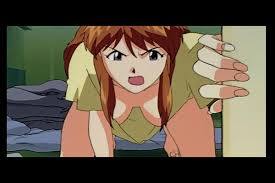
You also see it manifested through the angels, the strange creatures in Eva who supposedly desire to merge with Adam, their mother. Seeing this in the angels makes you realize that the AT Field is actually a metaphor for boundaries which implicates us all. In episode 22, Arael, 15th angel, seeks to understand Asuka. The angel uses its AT-Field (a beam of light) no, its boundary, to breach Asuka’s boundaries.


AT-Fields can be used to not only build up personal walls but to breach them as well. The irony of Arael’s action is that Arael’s AT-Field being erected while it floats just over Earth’s gravitational field makes it immensely similar to the Second Child; they’re both guarded.
The AT-Field is a funny sort of thing because it also sometimes explains how two people who are so alike can be guarded from one another. Sometimes you gain contempt for someone because they’re too much like your least favorable traits. You see this with Shinji and Asuka, both children without their mother desiring validation. Shinji calls Asuka a child midway into episode 9 and Asuka isn’t shy on voicing ideas of Shinji as dense or immature. They’re throwing stones in glass houses.
AT Fields are used to get the user out of dangers both physical and perceived. Sachiel, 3rd angel in the original series’ pilot episode, uses its AT-Field, in the form of flotation, to get itself from enemy fire. It never shows this until it is attacked first.
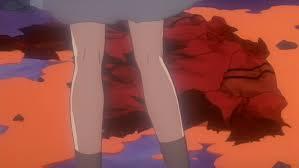
AT Fields are also responsible for one’s identity and physicality in Eva. Without the AT Field you don’t really exist. When Rei assumes the form of the person the character being cast into Instrumentality loved most in End of Evangelion, she’s causing the character to give up their AT Field. With that gone, they lose their physicality, turning into LCL (given the lovely term ‘tanged’ by fans). The ‘tanged’ individual suffers metaphorical death. Evangelion argues that in order for one to exist, others must perceive you and you must perceive you, a point best illustrated in episode 16. Since everyone is converted to LCL, no one really ‘exists.’ Rei describes this unnerving state as the inability of differentiating who you are and others, since everyone lacks a physical state without AT-Fields. Metaphorical death can be argued as worse than physical, since we all exist to make an impression of some sort. It’s what ties all the Eva cast together and the cause of their dilemmas. Validation. You can be living, yet very much forgotten or simply unknown.
There is living and there is “living.”
You can’t “die” unless someone knows you. You were never there.
AT Fields are the thing that make us live, but as a drawback, prevents us from understanding each other fully. Kaworu states in episode 24 that AT Fields are the wall of the mind and the heart of the soul, an unapproachable piece of sanctuary. When all else is taken from us, all we have left is our place of respite.
I’d also like to pitch the saddening reality that the AT-Fields are what prevent us from understanding angels as a whole, our genetic siblings as scared of this world as we are. The psychological angels want to understand us, that much is true. The angels, however, use forms of communication at the expense of our boundaries. Because people greatly value boundaries it makes it hard for us to comprehend angels. The creatures are hardly malicious when you realize they wonder why we all do things that actually hurt us, as well as the fact that they do understand our minds. But, because they breach our boundaries, we become even more wary of the (mostly) unknown. Angels may be us, but the strange forms they take are something we aren’t familiar with. The feeling is mutual with angels, wondering why there are many of us, our forms and outward appearances so identical. It’s a truth as old as time that we all fear the unknown.
The anxiety of an AT Field means comprehending that there’s very little chance to 100% get others. Because we’re all wary in some degree, because we’re set in an idea or perception of someone, even if the someone in the past no longer applies. It’s not healthy for you to continue dwelling on relationships not meant to be, keeping yourself up at night asking why, because both of you have closed off each other for good. There’s always that chance the other can come back and if they do seek to understand despite past hardships, that’s good. If they don’t, all you can do is move on and accept it.
IV. Kensuke Aida + War Idealism
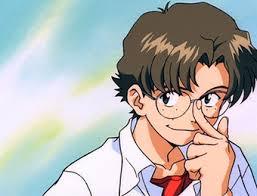
Kensuke is one of Shinji’s classmates, a supporting player in the series. He’s close with Toji Suzuhara, a boy who takes his anger on Shinji, after finding out that his sister has been injured during Shinji’s fight with 3rd angel Sachiel. As Suzuhara beats him down, Kensuke downplays the incident. Kensuke’s and Toji’s relationship is particularly interesting because the latter is affected to some degree by war (the war by humanity to prevent our destruction by angels). Kensuke glorifies the sentient, implicitly eldritch, multi-armored war-machines.
Kensuke can be best described as the ‘wow, cool robots’ drawing you’ve probably seen floating around. This is in relation to Gundam’s war commentary, but replace Gundam with Eva. Kensuke is enamored with the Evangelions and totally, willfully ignorant to the war horrors. Adolescents are forced to be the salvation of humanity, feeling every bit of damage to their own bodies whenever the Evangelion takes any hurt. Even after the war for humanity is long over, the pilots will be afflicted with traumas that will always hang over them.
Kensuke’s glorification is also what draws him to be Shinji’s friend. He uses Shinji’s status as a way of becoming a pilot himself by meeting up with Misato, putting himself at the cockpit of a strange creature magnificent machine.
When Toji becomes hospitalized after his battle in a hijacked Unit-03 vs. A Dummy System-controlled Unit-01, Kensuke expresses discontent at not being a pilot. He’s annoyed because “everyone” but him is a pilot.
Thing is, Kensuke isn’t heartless, just ignorant. Idealism is one of the uglier things that runs thick in the heart of Evangelion. His is one of many cases of unhealthy idealism in Eva, another example of making it difficult for those living to understand one another.
V. Shinji as the Audience Surrogate
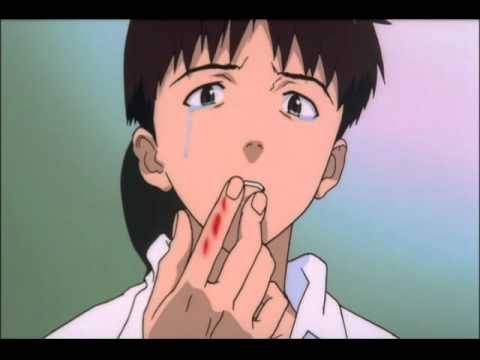
Shinji as the audience surrogate isn’t always touched up on, but is sort of understood subconsciously by a lot of the viewers. Shinji’s character is specific, yet so generalized that him being a surrogate for the audience just… works. Don’t believe me? Shinji gets two psychological exploration-based episodes whereas Asuka and Rei each have one. Episodes 16 and 24 are both psychological angel episodes, albeit the latter is more in-series subversive. The 24th episode doesn’t involve a breach of subconscious boundary, but the pilot (Shinji) is in the hot-seat, being made aware of their issues. Leliel, 12th angel, contacts Shinji in the former of these. Both characters talk to one another, shown as a series of horizontal lines and vertical lines, sometimes intersecting. These lines are a strong reference to the Johari Window, a tool in psychology which helps someone become more aware of themselves. The Window’s quadrants are as follows
1. the part known to the self
2. the part known to others
3. the part known to the self and others
4. the part known to no one
Leliel also states that the self only exists of one perceives themselves as well as others. The angel also states that Shinji could better his reality, to which Shinji absolves himself of responsibility by arguing the horrible state of his reality. It’s a subtle pushing to Shinji and by extension the viewer into free will. Kaworu builds up on these concepts with Eva’s in-universe concept for boundaries. Free Will versus Determinism is brought up here, with the idea that AT-Fields are brought up because the living (again, not people – emotional complexities aren’t only human) will them into existence. By exercising free will, it means enduring pain, one of Shinji’s, and again the audience’s greatest fears. Any relationship has pains and conflicts. This is all a buildup of free will, determinism, self-awareness, and the Hedgehog’s Dilemma. Understanding all of these means swallowing the “pain is inevitable” pill. The problem with much of us is that we like the idea of relationships rather than being in one. We want to feel validated but without the conflict, even if the conflict can be solved. We’re all Shinji because we’re all aware to life’s hellish catch-22s, so we run. There’s times in our lives where we run as far as possible from these woes, these truths, but there’s pain in running too. It’s why escapism seems like such a viable action for some of us.
Pain is inevitable, but pain can be mitigated.
More damning evidence to Shinji being a viewer stand-in lies in either endgame of Evangelion (pun intended). In EoE, after the Komm Susser Tod sequence of everyone on Earth being tanged, we’re treated to a shot of EoE’s live audience.
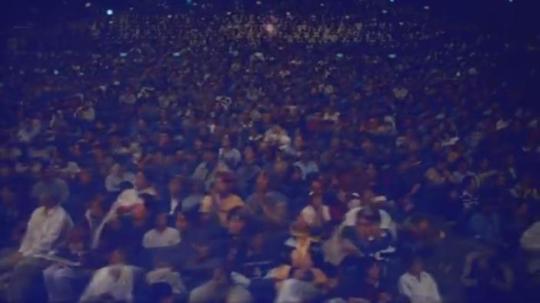
We hear Shinji’s voice about his reality while he talks to Rei toward EoE’s end. There are shots of the city, of people going about their daily lives cementing that this is about us. End of Evangelion shows us a less favorable side of Shinji, a departure from the lauded end series “Congratulations” scene, in which he does understand free will rather than perpetually dwell on negatives. Shinji reacts unfavorably toward Asuka in EoE after his mother’s speech to the audience that ‘anywhere can be paradise’ and Shinji stating he doesn’t know where his happiness resides. Shinji (We) still has a ways to go if he wants to be a better person.
It’s probably why many of us are either inclined to champion Shinji or harangue him, and either reaction is fair. Many of us are aware of audience surrogates, but never to this extent. Shinji isn’t his best person, but he can be. Being his best means self-reflection. Droves of people who first were exposed to Evangelion were teens, and again many of Shinji’s woes are specific yet so generalized, hence our feelings of defense and possibly disgust.
No one likes scathing, yet accurate call-outs on their person, but they’re paramount for us to understand ourselves and others.
VI. Abuse in Evangelion
One of the worst things recurring in all of original Evangelion is a bevvy of abuses.
Abuse comes in many shapes and forms and it’s many characters’ realities. Abuse happens not because the universe ‘wills it’ (determinism aka, ‘that’s just how people are’). Abuse, be it conscious emotional absence, actual neglect, among other ungodly acts fly though the cast.
Abuse is cyclical and a lot of those doing it often get away with murder because they have power.
Much of Eva is comprised of children being forced to sort through adults’ emotional baggage. Those children become adults and the cycle continues.
We all know a Gendo. Or even perhaps a Misato. Hell, even a Ritsuko.
Anno states that Gendo’s character is of a societal meta-text, which explains many viewers’ ire in relation to the character. He’s responsible for many of the seedy goings-on in Evangelion be it the financial (see: Jet Alone’s orchestrated out-of-control nature to give NERV more funding) or abuses (see: Rei, Shinji, Ritsuko, and, Naoko). It’s for this reason why Gendo’s actions are a sore spot for a lot of fans.
Anno: I’m not sure that it’s a real father [that Gendo represents]. Well, not a father in the sense of a parent with a blood relation to his child, but more, I think, [in the sense of being] a representative of society or the system. That’s why he has that expression.
Takekuma: So, he’s kind of amorphous.
Anno: The angels are the same. I made them appear amorphous in that way because, for me, society is unclear, the enemy is unclear.
Takekuma: Gendo is [a representation of] the boundries or the pressure of society itself.
Anno: That might be it. Perhaps Gendo is [a representation of] society itself.
http://wiki.evageeks.org/Statements_by_Evangelion_Staff
After many re-watches of certain Eva episodes, it just hit me, as I’m writing this why I’m sometimes apprehensive on an adult-exclusive lens of the show. This happens a lot in adolescence and our struggles are made trivial because of the mishandled baggage. As children, you’re meant to be subservient to parental whims. You have this sort of obligation to solve their problems. Give them closure. It doesn’t even need to be parental baggage, but just from adults in general. You see the way the adults act not just with the children but with each other. You see the way Gendo justifies neglecting Shinji, objectifying Naoko and Ritsuko or Naoko’s emotional absences as a mother to her daughter (also manifested through the MAGI). It’s these immature excuses as to why they can’t extend empathy to those around them.
It’s always excuses.
Eva’s original series has always been a show about children.
Tier 2: Just Below the Tip

VII. The Infamous Elevator Scene
VIII. Naoko + Casper
IX. The Other End of Existential Horror
VII. The Infamous Elevator Scene
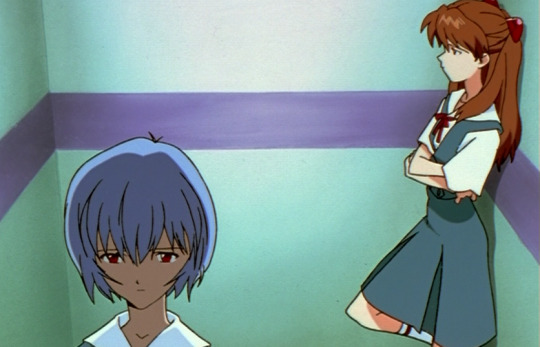
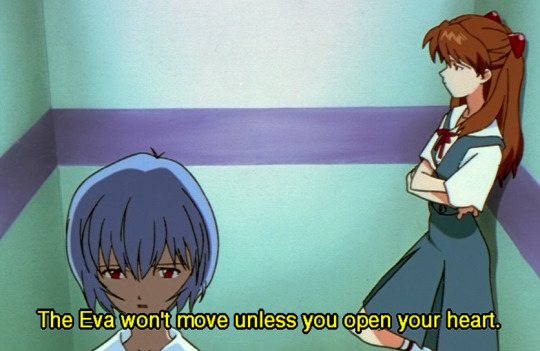
The Elevator Scene is a sequence that sometimes gets glossed over due to Evangelion’s fleeting budget. It took me years to realize the true gravity of the awkward silence of both the 22nd episode and its Director’s Cut version. The Director’s Cut version has Asuka abruptly jerking in the silence, but that blink-and-you’ll-miss-it moment speaks volumes. Understanding the scene means understanding why Asuka quietly stews in her anger. Understanding why Asuka stews means understanding Asuka from her debut to her emotional breakdown.
Asuka’s appearance in the 8th episode, Asuka Strikes!, is marked by a bold persona that carries on until the end. She isn’t shy on imparting her prowess to Shinji, stating that Units 00 as well as 01 were the prototype and the test type, respectively. Her Evangelion, Unit-02 is the finished product. She even states that she graduated from university. Despite these impressive feats so early in adolescence, the only time in which they’re noted is when Asuka talks of them. Misato takes in both Shinji and Asuka, but only ever “dotes” on Shinji. Gendo pays attention to Shinji because he pilots Unit-01, and 01 contains the soul of his late wife. Rei is the clone of Gendo’s late wife, hence Gendo’s attention and overall creepy, selfish obsession with her. Asuka and Shinji’s relationship, with Misato as their caretaker strongly mimics a Golden Child and the Second Fiddle. The only difference is, Shinji gains more attention due to Gendo’s and Misato’s respective baggage. Again, Eva is a series where children are forced to handle the baggage (with no break in the cycle) and when the child doesn’t have anything the adult particularly can clue in on, they become neglected.
That’s Asuka’s dilemma.
It’s why Asuka forces herself to grow up.
It’s why Asuka is driven to be competitive to Shinji and Rei, later growing contemptible at both.
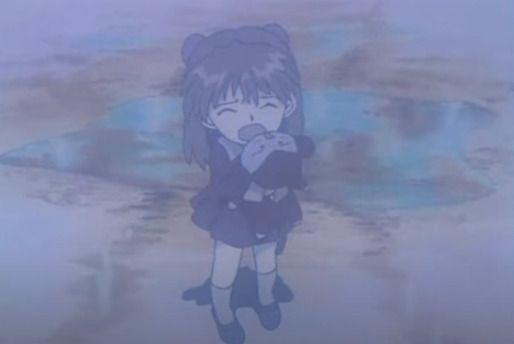

Asuka suffers a few curses, one of which being the youngest, the inevitability of being consciously sidelined dawns on her, leading to her selfsame breakdown toward series’ end. She aligns youth with trivialization, so naturally, she’d front with the opposite. She never gets help in relation to her period. Misato and Ritsuko realize something is up with Asuka but they never really offer her the support.
There’s also the flashback to her trauma in episode 22’s beginning. She’s replaced by her mother post-Contact Experiment (which led to a deterioration of her mental health) via a doll that looks like her, red hair in pigtails. It’s the leading factor to her feigned boldness, her ego. The way in which she is marginalized in the series brings it all back.
Rei breaks the silence with a few words of compassion and all Asuka can do is express disbelief. She mistakes compassion for contempt.
For pity.
The idea that anyone would extend kindness, especially now of all times, is unbelievable.

Asuka also experiences a dilemma here, a dilemma those like her face. She already knows what it means to be vulnerable and deeply hurt, but she needs to make herself vulnerable because now, more than ever, she needs the support. Being vulnerable will cause past traumas to flood back in full force, but by stewing she deprives herself of any support. Rei offers that support, but a few words of support in a wave of trivialization can’t help but feel a bit too strange.
Asuka’s greatest anxiety is realized in the twenty second episode. It’s of being and staying second fiddle, that she’s always been set up to fail. Even 2 episodes after the fact, in which she actually starves herself does she realize once more how she’s permanently ‘below’ others.
Asuka’s curse finds itself in real life, and it’s for that reason why I believe some find themselves resonating with her. Asuka’s gradual descent into bitterness is something I find myself waking up some nights thinking about after 7 years going through Eva; hers is a cautionary tale on being emotionally distant to cries of a damaged youth. Casually imparted knowledge of past achievements, and the competitive attitude mixed with embitterment, some of which from a genuine place but also a product of neglect. We were forced to play second fiddle, we forced ourselves to grow up to feel more legitimate, forced to carry an ire that stews because it seems no one listens.
VIII. Naoko+Casper
The late Naoko Akagi is a woman of multitudes. Those multitudes are compartmentalized into the 3 MAGI. They are Balthasar, Melchior, and Casper.
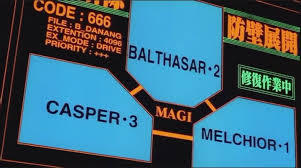
Casper shows itself to be the most prominent aspect of Naoko’s personality, her as a woman. Ritsuko states that, after the defeat of Iruel, 11th angel, that Casper is the part of her mother which remained that way to the end.
Balthasar and Melchior have been bested, be it by rival MAGI, or Iruel’s assault. This calls back to the fact that Naoko’s other facets aren’t anywhere near as prominent. Naoko has cited her own emotional negligence, of only showing emotions should it ever benefit her.
Casper on 3 occasions fights tooth and nail, Iruel’s assault, an attack by multiple MAGI in End of Evangelion or the defiance of Ritsuko activating the self-destruct sequence. Ritsuko does this to seek vengeance against Gendo for coming to the immense realization that he never genuinely cared for her. Gendo has always used Ritsuko for her body. This would destroy NERV, meaning killing herself and Gendo.
Then you realize why Casper overrides the sequence.
Casper’s stubborn behavior wasn’t actually to defend NERV but to protect Gendo. Casper’s defiance aka Naoko’s emotional absence toward her daughter allowed Gendo to kill a bewildered, rightfully angered Ritsuko.
The saddest part of Casper’s, no, Naoko’s choice is that Naoko got away with murder. Evangelion is a story about children dealing with the selfishness of adults and the adults never receiving justice for their wrongdoings. The relationship between Ritsuko and Naoko is an excellent example that this doesn’t just implicate the young pilots. Ritsuko dies in End of Evangelion with the truth that her mother, as a woman, in the end chose the man who manipulated both of them.
IX. The Other End of Existential Horror
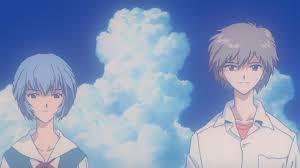
Some spend their whole lives trying to make a mark. Others can’t help but be known.
People get smart sometimes to get themselves out of a current situation. Kaworu and Rei’s existences are such that they’re deadlocked from living. Their existences are the product of an experiment, to be later heavily watched and raised as the Last Messenger. The latter is the result of Gendo’s obsession with his late wife.
Kaworu and Rei’s existential crises are opposite from the rest of the cast; while others do their damndest to become known, they cannot be unknown. Rei’s character centering more around her identity than other characters is also initially and sneakily alluded in the opening.

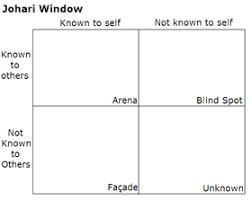
The Johari Window is a tool encouraging self-awareness in the person, alluded to twice in the show, with the second time being in the sixteenth episode. Both usages of that illustration, for Rei, and Shinji drive home crucial aspects of the meta-text.
This would also tie Rei to Shinji in End of Evangelion forcing Shinji to reflect on his own awareness and will. Rei is an astute, young girl whose arc is about her personal relationship with identity, something she is all too familiar with due to her objectified nature. Rei’s arc is even more so entrenched in identity than other characters that she is one of the characters imparting personal and universal realities.
Ayanami Rei’s existence from start to finish is inundated with the issues of others, causing her to internalize being always expendable. In Rei’s Poem in episode 14, it becomes clear that she sees herself based on usage. She likens herself to a field of flowers, which slyly alludes to the Dummy System’s “parts” 9 episodes later, other Reis.

Rei is seen as malleable vessel which houses thoughts rather than her own person and she can’t do anything about it. So she resigns to her reality. Even if she does tell off Gendo in End of Evangelion for his objectifying, she’s not even out of the woods. She never will be.
I used to think Rei’s “slap” to the face to the man with the (most) baggage was empowering. Then I learned about abuse during adolescence, how kids who lack a support system act while away from their abusers. Even saying an emphatic “fuck you” to your abusers isn’t enough to be a happy ending. Rei is a girl who lacks a support system and she suffers from it. Start to finish.
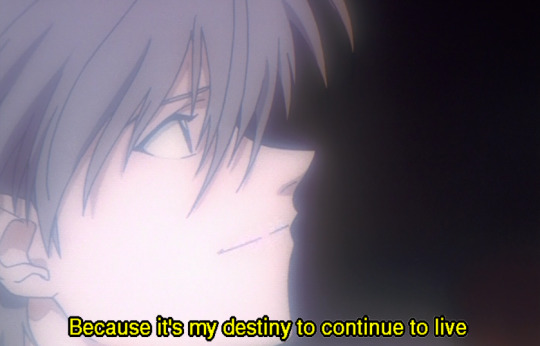
Kaworu’s crises are much trickier to pinpoint because there’s so little to work with. He doesn’t get an episode dealing with personal, subconscious explorations. Getting his character means first getting how Evangelion re-contextualizes what “Ode to Joy” symbolizes. It also means understanding the AT-Field and most people won’t pick that up on an initial foray. Or maybe even a second. Most people don’t pick up that the AT Field implicates anything living and physical or its metaphor for boundaries and identity. There’s the common misconception that Evangelion is a “human” show.
Kaworu marks off his appearance humming “Ode to Joy” while Shinji wonders who to turn to. It’s a song generally known for its jovial nature, but most importantly, Ode to Joy is:
known also as the “Choral” Symphony. Its finale is a musical setting of Friedrich von Schiller ’s “Ode to Joy,” a hymn to the unity and freedom of humanity.
http://www.dictionary.com/browse/ninth-symphony
The Choral Symphony assumes a more horrific context later on. Kaworu is the last messenger and what his action is would lead to the mass annihilation to lilin/human or angels. ‘Unity of man’ is changed in Eva’s context – it marks either unity of man or the death of man. It doesn’t matter who Kaworu allows unity to, because his hands would be stained with death anyway. Then you realize why Kaworu deploys his most powerful AT Field during his descent to Heaven’s Door.
This is his reality.
Kaworu’s status as the Angel of Free Will isn’t about him being the only complex angel, as a lot of people think. It’s about being the sole individual handing that freedom to others.
You realize his terrifying dilemma goes to the tune of being feared for his own existence as an angel (which he notes to Shinji) and not being able to properly live.
Sometimes you ”hurt” people by existing.
Sometimes people hate you for the simple act of existing.
Kaworu’s and Rei’s terror is the other end of existential horror, that you can’t help but forced to be known. Sometimes you have knowledge but aren’t allowed to do much with it.
Tier 3: The Body of The Iceberg

X. War Horrors of ‘Ambivalence’
XI. Unit-01 Berserk Scene
XII. Dummy Plugs + CNS
XIII. Kaworu + Adam’s True Power
X. War Horrors of ‘Ambivalence’
Episode 18 is where anxieties graduate into horrors both implied and visceral. Unease hangs over the episode, with the mystery of Unit-04’s disappearance and tests being done on Unit-03. Misato tells Shinji that because tests would be done, there’d be a pilot there. Misato uneasily withholds this info from Shinji and Kensuke breaks the silence with his recurring desire of being a pilot, still ignorant of the war horrors. There’s a subtlety that Shinji picks up on with Toji but not enough to put two and two together: that the big-eater himself isn’t feeling so hot.
The continual chirp of cicadas and birds nor the peel of the school bell are enough to break the unease of the viewer or of Toji. Toji goes from indirectly being affected by war vs angels to being chosen, drafted even, a child at the first line of defense for the apocalypse. We get a flashback of him beating down Shinji, before it cuts back to present day Toji. He will be in Shinji’s shoes.
Toji balls a fist, a recurring theme in Eva, to the tune of “What is your hand for?” Toji is finally about to take things into his own hands.
Asuka takes a few cracks at Shinji to Hikari that he hasn’t quite gotten the memo, but when Shinji asks her even she’s halted in words.
Then the day comes.
Tests are being done and suddenly Unit-03 goes rogue with Toji in her (note the Evangelions have the souls of the pilots’ mothers, save for Rei). Unit-03’s’s strange behavior is revealed to be the work of the 13th angel, Bardiel. Shinji’s ignorance is made worse by Misato’s absence (with Misato telling Ritsuko she’d tell Shinji the pilot’s info after the tests). Units 00 through 02 are sent out for the new threat and Shinji sees this new threat. Anxiety rises.
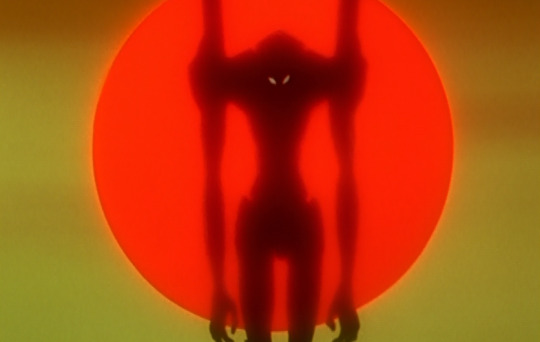
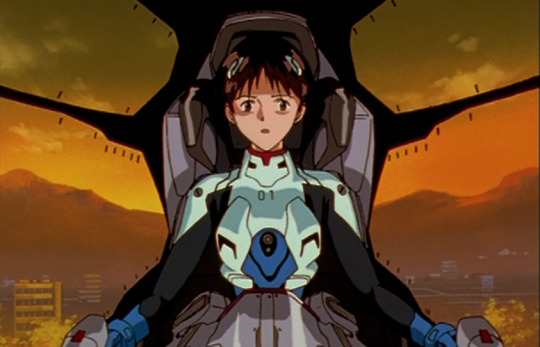
The song “Marking Time Waiting for Death” accentuates the anxiety. Unit-03’s silhouette eerily contrasts with the sun, her body slightly hunched and approaching slowly.
Fear washes over Shinji when he deduces that with an Evangelion inside, there must be a pilot.
Yet he still doesn’t know.
The other pilots are aware, and show reluctance to the revelation. A hijacked Unit-03 sets herself on Asuka, Rei, and even strangling Shinji. Shinji allows the angel-hijacked-being to strangle him, because killing another human being is simply horrific.

Eva has its hand in the war morals cookie jar here because Shinji stands at a conundrum, to other let this creature take his life or to murder flesh and blood. This dilemma goes double-time in war. Gendo asks why Shinji hasn’t dealt with the 13th yet, with a somewhat horrified Shinji pleading about the pilot. Gendo commands for the unfinished Dummy System to override Shinji’s controls and then suddenly...silence….
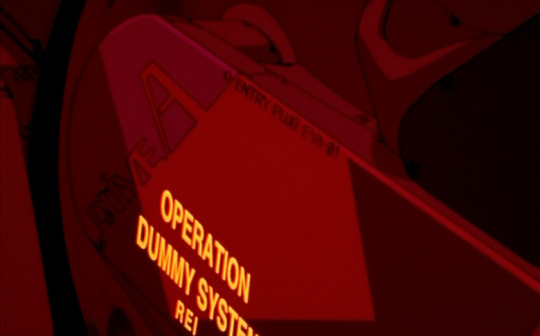
The Dummy Controlled Unit-01 springs back and we’re treated to a close-up of Unit-03/Bardi3l being strangled.


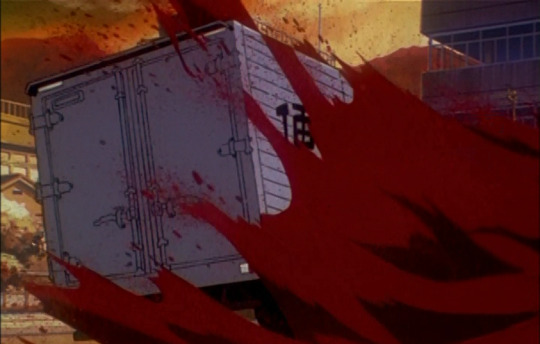
A nauseating crunch sounds and the unit goes limp. A controlled Unit-01 proceeds to raise hell on the incapacitated enemy, resulting in the unit’s blood and guts flowing through the streets. NERV’s personnel can’t do anything save for become fearful at the Dummy System’s capabilities. Terrible, visceral noises sound one by one as blows strike, as the unit’s severed limbs and blood splatters riddle the urban battlefield. Shinji hears every second, every squelch and splat.
Imagine the pain of 03’s pilot.
But the terrors don’t cease here.

01 doesn’t stop at just raising hell on the incapacitated 03, and we’re treated to another close-up shot of 01 tightly holding onto 03’s entry plug, before crushing it.
Somewhere away, Misato receives news that Unit-03 has been dispatched as an angel. Shinji feels the weight of having actually killed someone, before Misato actually breaks the news that the pilot is not only alive but that the greatly injured pilot is his classmate.
It never really hit me until now how this scene holds another horrifying subtlety. Compare this to episode 3, where Toji’s first interaction with Shinji involved him punching him, the very scene playing at this episode’s beginning. The 18th episode ends now with ,Toji and Shinji are both joined in the same camp, of children emotionally and physically marred by war, not able to fully control their situations.
XI. Unit-01 Berserk Sequence
Shinji stands in a situation where he can no longer take the terrors aligned with the Evangelion. He’s gone from sustaining injuries great and small from combat with the eldritch angels, to indirectly harming a friend through it. He resigns from his position as a pilot, understandably running away even with the approach of the 14th angel.
After a talk with Kaji about how he can control his future and he only, Shinji once again puts himself at the forefront of further pains. He must once more thrust himself to the terrors that align with the war-machines whilst struggling with other traumas.
During his fight against Zeruel, his Evangelion dies out and it all floods back to him. Shinji once again finds himself at a position of no power, frantically pressing at his controls to no avail.

He can only hear blow after blow of the 14th’s onslaught. He and Unit-01 are at their most vulnerable.
Until Unit-01 springs back.
W hat follows is the famous Berserk sequence, a scene whose terror can be thanks to Evangelion’s low budget.
We see the Evangelion in all her terror and the sort of off-ness that carries in this scene.

Episode 19 has no problems on treating us to front-row tickets to terror.
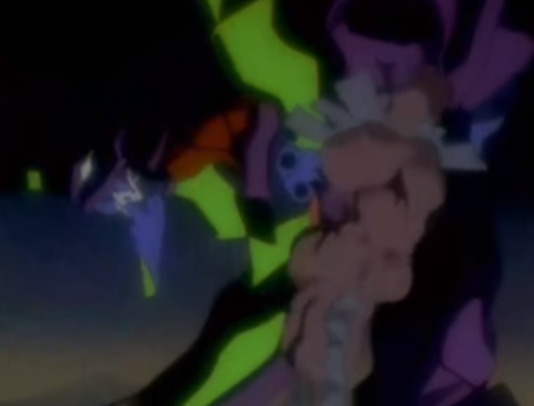
Unit-01 snatches part of Zeruel’s appendage and adds it to her mass. A sickening squelch sounds and her new appendage contorts into place in an instant.
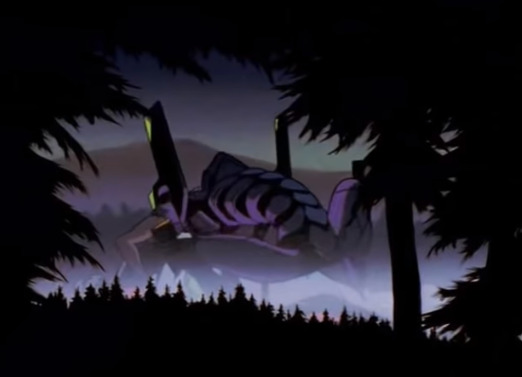

She moves over to her incapacitated, angelic meal and doesn’t hesitate to chow down. The shots feel too personal yet nowhere near in the sense of the show’s meta-textual reflections. It’s almost like stumbling on a cryptid and when she shoots a look at the viewer, it feels as if she’s looking at us, like we’ve interrupted her dinner. Or perhaps she did finish the meal... and she’s in the mood for seconds? Perhaps even thirds?
The bizarre and eldritch nature of the Evangelions goes full force with this imagery. Episodes 2 and 16 laid the foundation of how off the Evangelion Unit-01 was with how she openly mutilates her targets. Or even the unsettling roar of Unit-01 that’s not entirely bestial. The sound is straddles a line between the blood-curdling bestial and the human. But here? Eva Unit-01’s position, from her hunched figure, to her more feral position as she feasts, feels far too organic...and far too human.
The Evas themselves aren’t human, but the souls housed within are. Eva’s souls are souls of the respective pilots’ mothers, an example of the mother and child symbolism omnipresent in Neon Genesis Evangelion.
Shinji’s mother is Yui and as we go through the series, we realize the s2 engine appliance was intentional. An s2 engine offers infinite stores of energy and this is needed for Instrumentality. With the s2 engine within her grasp and the fact that Evas don’t subsist on anything, this would make the consumption of 14th completely recreational.
It’s super tempting to frame this scene as containing some abomination that now stands unchained and indiscriminate in its targets, but it isn’t. It’s sort of understandable because Units 00 and 02 don’t come close to exhibiting this sort of behavior nor were they in this circumstance. Neither Unit-00 nor 02 have any desires in regard to Instrumentality. In the end, we should look to Yui and her own endgame, because Yui’s running the show here.
XII. Dummy Plugs + CNS
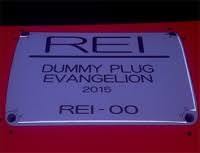
Ritsuko states the Dummy Plugs are machines which imitate pilot’s thinking. There’s a bit more than the possibility of this being 100% AI due to the apparatus Rei is in.
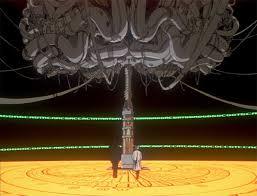
This very likely implies the respective person’s thought processes added with AI programmed in a way which best “describes” the pilot (basically how they are perceived). In episode 17, Rei is situated in this apparatus strongly resembling the central nervous system, the brain and the spinal cord.
{The central nervous system CNS is responsible for integrating sensory information and responding accordingly. It consists of two main components:
1. The spinal cord serves as a conduit for signals between the brain and the rest of the body. It also controls simple musculoskeletal reflexes without input from the brain.
2. The brain is responsible for integrating most sensory information and coordinating body function, both consciously and unconsciously. Complex functions such as thinking and feeling as well as regulation of homeostasis are attributable to different parts of the brain.
https://mcb.berkeley.edu/courses/mcb135e/central.html
Ritsuko imparts the unsettling revelation about Rei and by extension the Dummy Plant itself (after Misato coerced her into learning about Rei). The Reis are the core of the Dummy Plugs (and the System used to brutalize a hijacked Unit-03 and its trapped pilot). This scene adds more to the extent of Rei’s objectification, of her being replaced. It adds on to Rei III’s comment of being ‘the third.’
Rei isn’t savage by any means but the sheer brutality of Dummy System’d Unit-01 5 episodes prior may hint at her straightforward nature.
I’d like to pitch that Ritsuko’s approach to Rei’s Dummy Data was also the product of her subtle animosity toward Rei. When she refers to the Dummy Plug as a machine which mimics human thinking, she’s talking about Rei. She also refers to her similarly in episode 23 by referring to Rei as spare parts, as if Rei herself is some soulless machine whose parts can be switched out if need be. This could also call back to Rei’s poem, in which she calls herself a vessel which holds human thoughts.
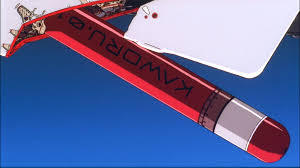
Another question remains: how does Kaworu play into this?
The MPEs (the Mass Production Evangelion series) use Kaworu’s Dummy data, meaning that there are cloned Kaworus stored off somewhere, perhaps floating with soulless smiles the same as Rei has.
Treated as spare parts.
This also implies that Kaworu is more or less reduced to an object.
What’s more disturbing is the nature of the MPEs gratuitous method of ravaging and mutilating Unit-02 and by extension Asuka.
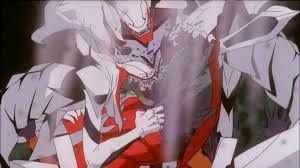
Kaworu hasn’t ever demonstrated any degree of malice, so this can’t really insinuate a ‘Kaworu is secretly evil’ narrative. But this can tie back to a recurring theme of humans fearing and despising angels. It’s because of this that the revelation of our genetically identical nature or the fact that they can comprehend our psychology is framed in-show as kind of shocking. It is because we’re so disturbed at the angels’ existence (or anything else we don’t comprehend) that we view them as inherently savage in nature. Kaworu’s quick-to-perceive personality most likely translated itself along with the AI. This would also rule in the somewhat strategic way in which the MPEs act against Asuka, exploiting her attack patterns through surprise attacks.
Some of Kaworu’s as well as Rei’s Dummy Data are the product of universal (Kaworu) and personal (Rei) contempt by people. Let that sink in.
XIII. Kaworu’s + Adam’s True Power
The bottom of the fridge horror portion of this iceberg is something that has subtly plagued me for years. We’ve only ever caught glimpses of Kaworu’s abilities in his debut episode. I picked up on it little by little with each re-watch of the episode, with every other time his abilities dawning on me. If I wasn’t focusing on how his character fits in the greater framework of Evangelion, I was cluing in on his abilities.

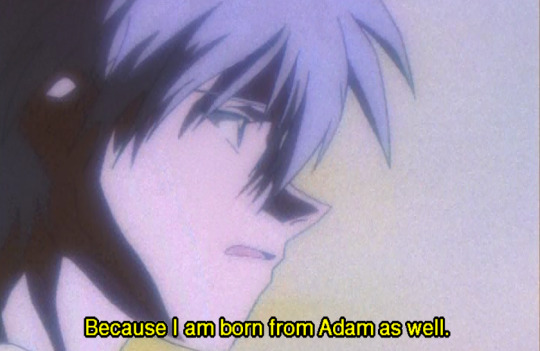
One of his abilities is being able to block out light, magnetism, and subatomic particles. Some of the forces which make up the universe. This witnessed by the viewer when he realizes the whole of humanity’s welfare hangs by a thread, due to the coexistence of angels and Adam.
Adam.
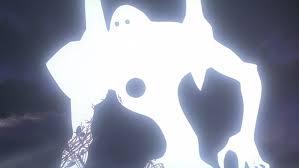
Adam’s soul lies within Kaworu. Adam. Who utilized an Anti-AT Field which caused Second Impact. An Anti-AT Field, which killed off much of the Katsuragi Crew in Antarctica.
This makes Kaworu the most powerful angel in the original Evangelion series.
Eva has shown that ownership of an angel’s soul (or partially, if you’re onboard the Rei I is in Unit-00 theory) allows the person to inherit the angel’s abilities through Rei. Rei blocks off Kaworu’s immensely powerful field with one of her own, canceling out both as a result. As we know, AT Fields for people are a figurative affair. People lack the physiology to exhibit a physical AT Field because they don’t have cores like angels do. Angels’ souls when possessed by humans have a sort of ability to circumvent parts of human physiology (if you’re looking for the whole package, you should eat angel’s flesh too). Rei also shows the ability to float, implied in episode 24 and shown explicitly in End of Evangelion.
But this raises a few questions about the last messenger is the ability to block out some of the forces of the universe Adam’s powers or Kaworu’s? Another ability that continues to plague me the more I think about it is Kaworu’s AT-Field usage on Heaven’s Door to bypass its lock.
We haven’t actually seen Adam’s other powers (if the angel has any) because the it’s anti-AT Field was halted via Lance of Longinus. Other than its ethereal appearance in flashbacks, we only see an incapacitated Adam in embryonic form. That’s it. We don’t know if Adam exhibits any other powers due to this impediment. If Adam does have more powers, this would add onto both the fridge horror factor of Adam and Kaworu.
Tier 4: Pre-Abyss

XIV. The “Nihilist” Lens
XV. The True Nature of Sync Rates
XVI. Unit 01+ MPE Gorging Scenes
XVII. Ancient Ruins of Arka
XIV. The “Nihilist” Lens
There’s something that implicates the whole cast. Something that goes beyond the meaning of the AT-Field, and the all-too-known Hedgehog’s Dilemma.
Eva is filled to the very brim with psychological concepts, but there’s one thing which ties this all together. It goes much larger than the desire to become validated or cycles of abuse and unresolved issues to a newer generation.
Free Will Vs. Determinism ties the entire cast together and is disturbing in its own right. It not only ties the cast together but also contributes to Eva’s meta-narrative.


Episode 16’s sequence with Leliel, Shinji, and the Johari Window gives little breadcrumbs to this psychological dilemma. Leliel teaches Shinji about his own identity as well as slowly ushering him to a sense of self-awareness. Leliel also attempts to usher Shinji out of filtering reality with only convenient parts. Shinji argues that he can’t really be held culpable for his actions, because the one and only reality is that reality is awful, bar none. Not his reality, but reality as a whole. This deterministic stance becomes ever more blatant 8 episodes later with the appearance of Nagisa Kaworu.
Kaworu’s designation is the angel of free will. The irony of this stands in the fact that Kaworu isn’t the only angel who can exhibit free will (with some of the angels before him taking the time to try comprehending people). Kaworu’s status comes from his identity as the last messenger, bringing about freedom for one species (humans/lilin or angels) at the expense of the other. Kaworu knows his reality well and in the end, seeks to better the reality of those around him. Eva doesn’t romanticize the prospect of free will, however, because Kaworu is so aware of his own person and how he can hurt those around him that it greatly bothers him.
The metatext doesn’t just position Shinji as being in the wrong, but also the audience. Remember the point I made before about Shinji being the audience substitute? It’s further hammered home from the series’ tail end and into End of Evangelion.
“That’s just the way things are.” is a common response to things in life we feel resigned on changing, because we don’t know how to change them. This quote is a parallel to Shinji’s “humans aren’t made to float!” in episode 16.
Shinji does know how to change much of his reality, but by doing so he’d be pushed into free will. Free Will is the solution and it means holding yourself accountable rather than believe that it’s everyone else with the problem. With the idea that you can change your reality, it offers you the opportunity to love yourself.
If you love yourself, then it becomes much easier to love others.
Eva’s free will and determinism metatext hammers home the extension of empathy.
Shinji/the viewer’s greatest problem is that because we don’t love ourselves it makes it difficult to extend the love to everyone else. Shinji’s love translates as idealism. Because of his unhealthy idealism, he is hindered from understanding people.
By ascribing your beliefs from determinism to free will, it opens your mind to an entire world of possibilities, but therein lies the terror. It is because of these possibilities that Shinji and by extension, the viewer, likely fears free will. Shinji finds ways make himself validated, but with free will, the argument could be made that it doesn’t matter. There’s the anxiety-crippling likelihood that none of it actually matters, because your existence doesn’t matter. If we’re going on this bent, acts of making an adequate impression on others are acts of personal denial. In the end, these are what they are, possibilities.
The greatest terror of it all is that we don’t know.
User power-chords makes an excellent point about the inherent darkness of an internal locus of control.
User power-chords posits the idea of existential absurdity for Shinji not as a certainty but a possibility. There’s always a likelihood that our desires to comprehend the world around us, to find ultimate understanding are in vain.
Cheesy as it sounds, people fear ambiguity because we seek a satisfying end. We don’t just seek answers. We want outside closure and inner peace, but we won’t always get it. It’s why we rationalize relationships that end on bad notes. Sometimes you worry about your falling-outs...and it hurts. You never got the answers your wanted so this pain carries, for months, sometimes even for years. Dwelling on the issue serves no purpose other than to keep that hurt with you. The best thing to do sometimes is to find your own closure, your own meaning.
No, Evangelion isn’t actually pro-nihilism, but it presents us with that likelihood. That’s what makes this aspect of the narrative so terrifying: The consideration that we find meaning in the meaningless.
XV. The True Nature of Sync Rates
The nature of injuries and having them in adds onto the innate horror --be it war or otherwise-- and themes of the Evangelion. The severity of the injury is based on how high the pilot’s sync ratio is. An average rate while sustaining damage will bring hurt to the actual pilot in the respective spot. Some examples:
Sachiel makes multiple headblows to Unit-01 and Shinji in episode 2, causing head trauma.
Ramiel’s, (5th angel), particle beam attack in episode 6, an attack so severe that Shinji needed medical care.
Unit-00 and Rei being infected by a Bardiel hijacked Unit-03 in episode 18. Toji’s condition in episode 18 stands as a large example of the innately disturbing nature of sustained injuries.
Toji’s condition becomes all the more nauseating when you see Evangelion parts and blood flow through Tokyo-3.
Toji could feel every last second of strangulation, body blow, and feel the unspeakable pain of his arm being severed. Let that sink in.
Asuka receives the worst of these considering the nature of her sync rate being high. The higher the rate the more kept the damage is. The circumstances behind Asuka getting the worst of it goes back to the AT-Field. Asuka understood the meaning of the AT-Field, that the more you open yourself up to others, the more hurt you become. The realization dawns on Asuka as her mother from within the Evangelion shields her from the onslaught of JSSDF troops.
It’s then that Asuka finally comprehends what the Absolute Terror Field is. Despite her emotional needs being neglected, realizing she’s set up to fail, and going comatose she still goes on.
Asuka, despite everything, takes a chance and opens her heart knowing the double-edged nature of the AT Field. What happens next?
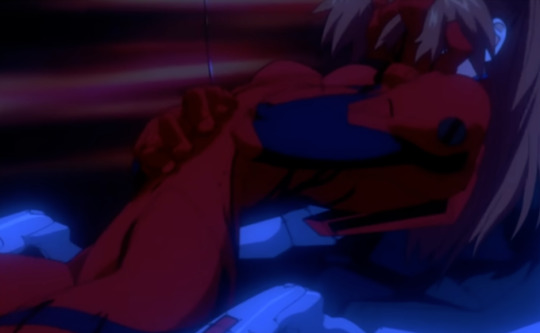
Asuka took a chance.
She opened her heart...
...and she got hurt all because she opened herself.
XVI. Unit 01+MPE Gorging Sequences
The brutality of both Unit-01 and the Mass Production Evas holds three layers: of visual horror, implied horror, and thematic horror. Unit-01, after taking Zeruel’s s2 engine into herself, proceeds to then brutalize the 14th angel by way of still gorging on it. The feeding was entirely recreational considering Evangelions don’t subsist on food to function. This was more about the sheer act of brutality for brutality’ sake.
The Mass Production Evas also fall under this category, the way in which they deal with Asuka after incapacitating her with a replicated Lance of Longinus is also sadistic and gratuitous. They also proceed to gorge on Asuka, her fate made worse through the simple fact that her sync rate is heightened.

The MPEs don’t even swiftly finish her off. She is in a state of tremendous and unimaginable pain. They fly above her slowly, circling above her mangled Eva.
They are almost mocking her as she can do nothing, save for writhe. Asuka’s seething, repeated “I’ll kill you...I’ll kill you….” is then silenced by the MPEs spearing her down.
The brutality doesn’t end there, as we see much darker implications of the damage sustained toward the end of the first half of End of Evangelion.
Shinji bears witness to the implications after seeing the decimated remains of Unit-02 being carried off by some of the Mass Production Units. The sickening reality of it all dawns on him and he is once more exposed to the woes of war and the nightmarish aspect tied of the Evangelions.
XVII. Ancient Ruins of Arqa
We’re ending the pre-abyssal end of the iceberg with Evangelion’s original proposal.
Eva’s proposal, a far cry to the show today, had a more sci-fi angle to it. Psychological concepts weren’t exactly pitched nor was it self-aware. The angels weren’t even referred to as the angels, but as the Apostolos. Instead of the 18 we were presented with in the original show and the movies, there were 28 Apostolos.
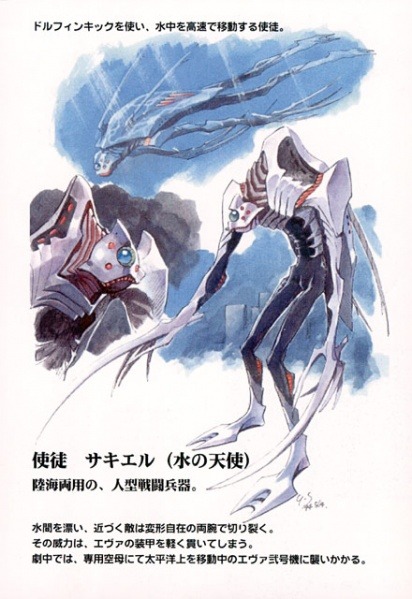
The Apostolos designs stand as testament to how far of a departure the proposal was to the final cut. They look far more menacing than the more amorphous, much softer defined, beady-eyed angels we’re used to. To top it all off, the Apostolos were the de facto villains of Evangelion’s prototype pitch. The Apostolos in the Proposal, toward the end, proceed their onslaught as a group rather than the series’ one by one. Toward the series’ end, the 12 strongest Apostolos begin their assault on North America, annihilating the continent in its entirety.
Only 12 of the creatures laid waste to a singular continent.
Episode 24: "Now, the Promised Time"
Rei breaks down. Her secrets are revealed. At last awakened, the twelve strongest Apostolos descend from the Moon. Both Eva Unit-06 and the American continent vanish completely. Humans acknowledge their helplessness in the face of the Apostolos' crushing power. The promised time, when people will return to nothing, approaches. A human drama in the depths of despair.
Episode 25: "Arqa, the Promised Land"
The laboratory holds the ancient ruins of Arqa, which have become key. In order to stop the twelve Apostolos, the United Nations' head members annul the Human Instrumentality Project and resolve to destroy the Apostolos. Shinji's father objects. Shinji and the others stay at the laboratory for Rei. A drama of people conflicting over incongruous objectives.
https://wiki.evageeks.org/Resources:Neon_Genesis_Evangelion_Proposal_(Translation)
The aforesaid creatures were so powerful in the original pitch that Human Instrumentality and the ancient ruins of Arqa would be the way of stopping the onslaught.
Tier 5: The Abyss

XVIII. Split Second Misato Death
XIX. Humans Are The Villains in Eva
XX. The Ultimate Paradox
XVIII. Split Second Misato Death
As the last and most explicit aspect of original Evangelion, it would only make sense that EoE specific content would take its place in Tier 5. End of Evangelion is a 90 + minute tour de force with disturbing imagery back-to-back. Split Second Misato Death refers to one of the most unsettling images sprinkled all throughout the movie. Here are a few of the many examples of EoE’s building up on Evangelion’s ugliest parts.
Everyone cites the infamous hospital scene not even 5 minutes into the film as the first proof, but user power-chords has pointed out, Shinji has actually attempted suicide (refer to the ‘Free Will v. Determinism’ part of the iceberg.)
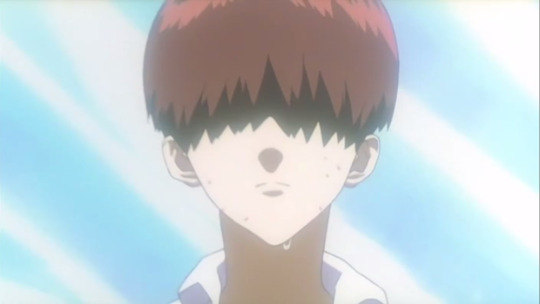
After Misato is mortally wounded and sends Shinji off in an elevator not long after, the JSSDF blow up that part of NERV. A few people have pointed out the most disturbing facet of this scene: through freeze-framing that you can actually see Misato’s body during.
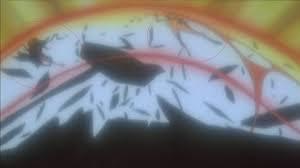
The JSSDF scene partway through End of Evangelion in which NERV personnel are summarily annihilated.
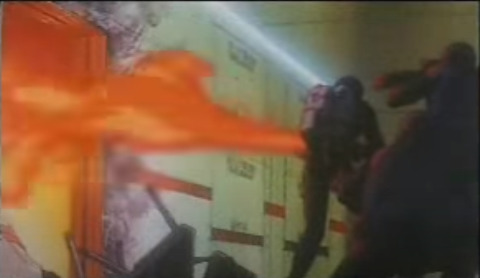
For those missing the small detail of Shinji’s attempted suicide ,Shinji’s depressed state is made more clear when the JSSDF locate him. When they do they attempt to kill him execution style. Shinji doesn’t move.
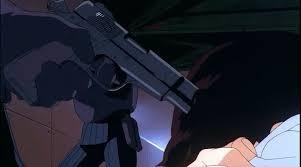
“I don’t want to die…!” during the JSSDF’s assault, Asuka is awoken from comatose state. She is protected by her mother via an AT-Field by Unit-02. She gains back her self-preservation after this realization, and multitude of images play. One of them is an extremely gruesome close-up of Asuka’s face. (extreme body horror warning, proceed with caution)
The Komm Susser Tod scene beginning with Shinji strangling Asuka in harsh coloring, Naoko’s same action toward Rei plays right after. A few disturbing child drawings follow after, predominantly featuring death. (seizure warning, body horror warning)
End of Evangelion’s flooring nature comes from the fact that it builds up on the subtly horrific and makes these terrors explicit. Whatever existed beyond closed doors becomes now available for us to see,
XVIII. Humans Are The Villains in Eva
At the penultimate point of the abyss lies a horror as old as much of time. Of the humane being more disgusting than the monsters.
That we can be monstrous.
This fact becomes known with the appearance of the JSSDF as dispatched by SEELE, methodically mowing down NERV personnel with little to no weaponry of their own. We’re treated to NERV’s personnel in their hallways, some forced with the moral dilemma of leaving their own to die while surviving or helping their own while both end up being gunned down.
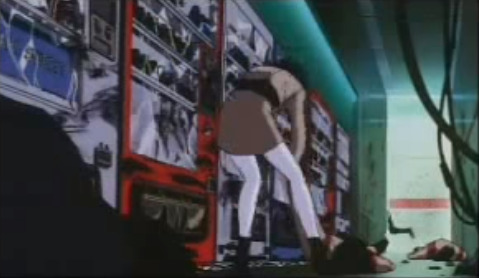
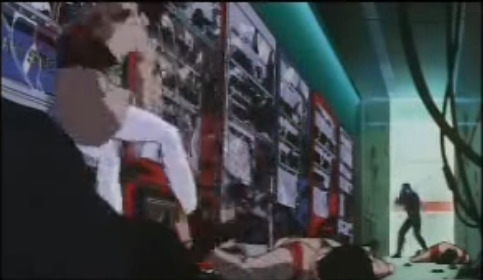
It becomes apparent that SEELE has been gradually, intentionally chipping away at NERV’s Defense Budget, getting rid of the (little) competition they have after the defeat of the Last Messenger.
There’s a degree of contempt and casual sadism that comes with how they kill the personnel. In one instance, a NERV worker surrenders to the JSSDF, before being killed off in execution style in the distance (one headshot plus two extra shots for good measure).
When you look back at it, this sort of sheer, unabashed brutality wasn’t felt about the angels. Human attitude about the angels is largely fearing, anxious. This attitude accentuated itself through a sometimes nervous soundscape. Of observing these weird, ghastly creatures as they creep and swim. And the feeling’s mutual. The problem is that we don’t know.
But here? We do know.
When the JSSDF move in, the anxiety of angels graduates to the full-force dread of creatures that have killed before. The greatest enemy to humanity has always been with them all along, forcing them to a catch-22. The dread falls on Maya because she understands this perfectly. NERV has only ever shot at targets rather than living flesh…
...and SEELE knows this.
SEELE’s slow, but sure suppression of NERV’s budget is kicking a man while he’s down, but the man in question is a child instead. The JSSDF have more than enough firepower, calling it overkill goes beyond an understatement.
The JSSDF demonstrate the lack of remorse further with the discovery of Third Child, Shinji Ikari. One of the members presses the barrel to Shinji’s head before Misato steps in and kills the members.
The JSSDF isn’t the only damning evidence of how ugly members of humanity can be, however.
Humanity’s on-occasion grossness shows itself in small ways throughout the series, in dislike and conscious emotional distance for individuals, or beliefs of the angels being unintelligent and/or savage. Other times it manifests fiscally, in orchestrating more ethical approaches to stopping certain destruction to go seemingly haywire in order for NERV to receive more funding. This all due to a rival company of NERV challenging the very idea for its usage of child soldiers.

The worst of this damning fact is that many of the morally repugnant members exist on a higher echelon of society. There are Gendos running around, doing as they so please and they’re the tip of their echelon iceberg.
XIX. The Ultimate Paradox of Evangelion

“Anywhere can be paradise as long as you have the will to live.”
We’re treated to these words as Shinji finds himself on shores surrounded by an isolate hellscape, with Asuka next to him. The strange and altogether horrific nature of End of Evangelion has gotten fans believing on End of Evangelion’s endgame was in certain, nihilistic. But Eva dipping its hand in the likelihood of meaning in the existentially meaningless isn’t even the ultimate terror of Eva’s self-aware universe, nor is it the tendency for man to become contemptible towards itself.
Evangelion greatest terror is the paradoxical nature of free will.
Yui’s words to her son as she drifts off into the ever-expanding cosmos, her status as a deity realized, is that paradise is universal. EoE assumes this unconventionally positive approach to a whole series worth of characters’ woes. The issue is: finding paradise is ultimately conditional.
Free Will’s paradoxical nature is what gives credence to the ongoing Free Will vs. Determinism dilemma. People can use their free will to take away yours entirely and this is most evident with Rei. Her existence is the result of a man’s unhealthy attachment to his wife, her lack of self-preservation the result of being conditioned as a multi-purpose vessel; her desire to merge with Lilith to become an omnipresent mother-figure was not hers. The nature of disallowing free will exists on a spectrum, as people can use their free will not to take away the whole of others’ freedoms, but to disallow them proper emotional growth. The adults around Asuka weren’t around for her during the series, leading to her eventual downfall.
Unit-01, throughout much of the second part of EoE holds the power to give or deny people’s physicality due to her status of having both Fruits of Life (the s2 engine held by angels) and Wisdom (from the Lance of Longinus merged with the Eva earlier on). This gives Unit-01 her deity status and while within Lilith-Rei, Shinji realizes that not everyone would be there in his life, that he can’t be in the center of others’ lives. It’s for that reason why he denies people’s physicality (“They can all just die.”), which turns people into LCL.
Shinji gives allows people the ability to come back from Instrumentality after realization arises that without other people, there’s no way to tell if Shinji, himself exists or not. Kaworu and Rei also give him the reality that with people back, pain will become an inevitability once more. With all the souls gathered by Lilith-Rei, they are released after her death.
With the souls of those cast into Instrumentality dispersed, those turned into LCL now hold the ability to come back from Instrumentality if they so choose.
While the idea of anywhere being paradise rings true, it’s not entirely satisfying to say that EoE is unconventional in its uplifting message to the viewer. Evangelion is at its core a cautionary tale. It warns the viewer into extensions of empathy and openness that others would properly live. This goes double for those with power. Without that compassion, we’ll have Asukas, Misatos, Ristukos, as well as Reis, those in the world whose downfalls come from emotional absences, neglect, objectification, and forced baggage. We would have Shinjis, those wanting to be at the nexus of others’ importance because they were deprived while young.
Kindness is a powerful thing and the lack of compassion present in all of Eva implicates most everyone. It leads to yet more abusive cycles, with the only thing breaking that cycle being a hand for those in need.
XX. Conclusion
What more can be said over this juggernaut which is a host to a bevvy of darkness? Evangelion is testament that anxieties and horror don’t need to start out as blatantly shocking or visceral to make an impact years down the line. They also don’t need to be out in the open to initially hook you either. You pick up on a few anxieties as well as horrors and you realize deep down, there must be more, which drives many of us to engage in this often times unabashedly dark source material.
Some of us are doing it later in the throes of adolescences, others are doing so well into their 20s, possibly dipping into their 30s. Point is, it draws in a lot of us and for a lot of us, it doesn’t ever let go.
Some of its charm could be chalked to the visceral ways in which characters interact. Even after years of re-watches, I’m still learning new things about the child soldiers, and I’m quite sure there’s others finding small details. There’s also the possibility of Eva’s approach to terror. I think Evangelion “humanized” its horror. It didn’t make horror a universally human feeling, but made it so that the true big bads looking to cause apocalypse weren’t actually the eldritch. Many of the angels are more or less lost kids looking for their mother (I still think Ramiel’s “singing” in episode 5 was it calling for its mother!).
With those newer details after 20+ years, there will be more added to the iceberg. Hell, there should be more added to the iceberg. This iceberg is the tip of an even greater iceberg. I’m still learning about their adults and their desires as well, how cyclical their actions are. For others, the draw-in factor lies in its low budget. Personally, it’s all of these for me: the low budget helped cement these darker aspects of the series due to horror and the genre’s overall relationship with limitation. It works best on limitation and had Eva worked with a much higher budget, I don’t think the content would be as effective, or perhaps it’d be much more difficult to make it so.
Evangelion is such a well-done, deceptively compact series that each lens a fan assumes has its own interesting rabbit hole. Your circumstance shapes the experience, and this too involves how you navigate the series’ menagerie of terrors.
I’d also like to thank the reader for getting through the largest rabbit hole in Evangelion. I’d also like to thank you for getting through the whole of this meta from a fan who slowly began to resonate with the characters as the years went on!
#neon genesis evangelion#shinji#kaworu#asuka#rei#seizure warning#body horror warning#suicide mention#correct me if im wrong#credit goes to twitter user decoratedboar for the iceberg picture help#and fixes
3K notes
·
View notes